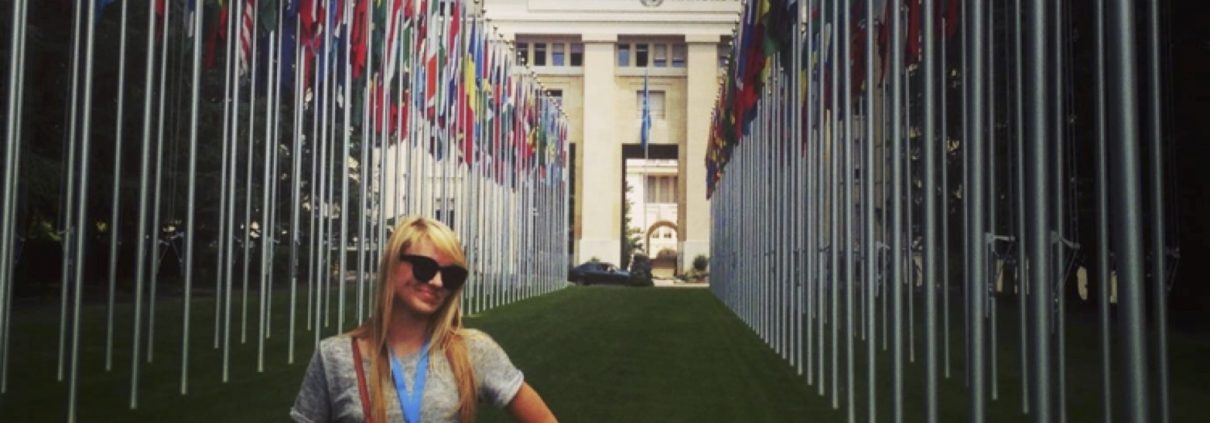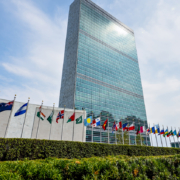Alcohol Abuse in the UN
By Kathryn Merrill MSW ’16
Geneva, Switzerland. It is not a destination one commonly makes grand plans to see in Europe. But it is stunning—a quaint city hugging the corner of the crystal clean Lac Léman, which I swim in almost daily. Elegant white swans glide below the iconic Jet D’Eau that intersects the horizon triumphantly against the shoreline stretch of neo-baroque facades. It may be small, but it exudes an ultra-cosmopolitan feel. People from around the world come to Geneva trying to do one of two things—either to save the world or to buy it. That’s right, a city of humanitarian workers and bankers, living harmoniously together at the base of the Alps. Needless to say, the place is dripping with class.
I arrived at the global headquarters of The Office of the United Nations High Commissioner for Refugees (UNHCR) to run a study on staff alcohol abuse within the Staff Welfare Section of the organization. I believe I was selected in part because of my MSW internship experience this last year providing therapy for individuals suffering from substance abuse problems at a recovery organization in Santa Monica.
I am working on a team of about a dozen, only 4 of whom are ever in Geneva at one time—everyone else is on mission, meaning at other UNHCR field locations, such as South Sudan, Burundi, Tunisia, etc.—providing much needed mental health support to employees attending to the modern refugee crisis the world faces. At the start of my internship, UNHCR reported that the number of refugees, asylum-seekers, and internally displaced people worldwide has—for the first time in the post-World War II era—exceeded 50 million people. One could say that the organization has its work cut out for them.
While humanitarian workers on the whole exhibit substantial resilience and high personal reward from the courageous and vital work that they do, I have learned, they are under unimaginable stress. In the more dangerous duty stations, attacks on UN workers are becoming more and more regular. Staff are constantly exposed directly and indirectly to horrific scenes of death and rape and torture, loss and destruction. They are standing by the victims whose family and nations are being ripped apart by the innumerable conflicts of this age.
In these deep field stations, where workers too are separated from their families (it’s too dangerous to bring them there), who work demanding hours, who live under strict curfews and bleak confines—for many, I have learned, drinking is an all-too common way to pass the time and forget, if only for an evening, the hardship of their work.
A recent internal survey on global staff well-being brought to the Staff Welfare Section’s attention that a large proportion of staff members were at risk of abusing alcohol. This prompted them to draft a policy that prohibits alcohol in the workplace. My job has been to evaluate the organization’s readiness for such a policy and to qualitatively assess the breadth and depth of the alcohol abuse problem in field and headquarter locations across UNHCR. I have done so by conducting approximately 100 15-30min telephone interviews with UNHCR workers (of all job classes, nationalities, duty stations, etc.), gathering inside information on the issue, while protecting worker confidentiality at all times. I will synthesize, code, and summarize my findings in a report at the end of my internship. I am simultaneously performing a literature review on evidence-based alcohol workplace interventions, identifying best practices (used by other intergovernmental, multinational, and civil service bodies) and making recommendations to UNHCR based on my findings.
The stories I’m hearing in my interviews are insightful, detailed, and emotional. UNHCR workers have the biggest hearts—there is so much support for one another as well as for the beneficiaries they are proud to serve. In the interviews, they have been generous with their time and opinions on the topic of alcohol abuse and I feel lucky to be the one who gets to relay their eye-opening messages. It is my deep hope that I do them justice. Although UNHCR has more staff counseling support than any organization like it, it is clear that more needs to be offered in terms of staff alcohol education, individual counseling, and recreational alternatives to drinking at the end of a long and psychologically tumultuous day in a refugee camp. As one worker put it to me: “How would you like to be the one that shuts the gate on a screaming family because the camp has reached capacity? How do you sit with that at the end of the day?”
Yes, that is hard to imagine. Yet I strongly believe these are the questions one must ask oneself in the design of an informed and empathetic policy on this complicated issue—one that I feel truly honored to be at the heart of.






